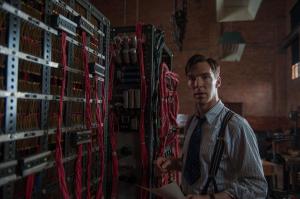This is the second part of the series Watching War Films With My Mate’s Girlfriend. For the first installment, see here.
Building on work by Polish cryptanalysts, British intelligence managed to decipher German codes sent using Enigma machines during the Second World War at Bletchley Park. It is commonly held that this shortened the war by at least two years. One of the main people behind this project was Alan Turing, who was given an OBE for his work. After the war he moved to Manchester and worked on developing computers. His “Turing test” remains an important part of Artificial Intelligence debates.
In 1952, his house was burgled. It transpired that the burglar was an acquaintance of the man Turing was in a relationship. Perhaps naively, Turing told the police this. The police acted quickly and arrested him. Turing, that is, for the crime of being a homosexual. He was convicted, and given a choice of prison or injections of oestrogen to “cure” him of his homosexuality. He took the latter. In 1954, he died, of cyanide poisoning, the inquest ruled that this was suicide, which is probably correct though some dispute this, believing his death accidental.
In 2009, the then Prime Minister Gordon Brown apologised for Turing’s treatment, and on Christmas Eve 2013, the Queen signed an official pardon. Both of these should not have been done, but we’ll get to that later.
The story of the breaking of the Enigma codes was kept secret until the 1970s, a surprising thing in our age of Julian Assange and Edward Snowden. Since then, Bletchley and Turing have featured in books, plays and films. Robert Harris’s Enigma tells a fictionalised version of the story of breaking the ciphers, and was turned into a film, produced by Mick Jagger (who, perhaps bizarrely, owns an original Enigma machine). The play Breaking the Code, telling the story of Turing’s arrest, with flashbacks to his time during the war, was filmed for TV in the 1990s, starring Derek Jacobi as Turing, and Harold Pinter as a mysterious man from the government. Enigma had been re-released on DVD, probably to cash in on the release of The Imitation Game.
The film fudges some dates and facts, and puts the spy John Cairncross in Turing’s team at Bletchley Park for dramatic effect, it is, nevertheless, probably the best British film of the year.
Told in flashback as Turing – a brilliant performance from Benedict Cumberbatch, who will win a BAFTA for this performance – tells his story to the detective who realises he is hiding something about the burglary that led to his downfall, the film not only tells the story of Turing’s wartime work but of the beginning of his interest in codes and his first love at boarding school, a relationship that ends in tragedy. That, in short, is the film; triumph bookended by tragedy.
For a film that contains so much tragedy, it is funnier than you expect, with Turing’s borderline autistic view of the world getting several laughs, his initial interview for Bletchley is particularly funny. The comedy of the early scenes just makes the heartbreak you know is coming harder. The cast is faultless, from Charles Dance as the Naval Commander running Bletchley, to Matthew Goode – who always excels in period roles – as the colleague and rival of Turing who becomes an ally. Special mention must go to Mark Strong is brilliant as Stewart Menzies, the wartime head of MI6 – seriously, someone give this man a leading role in a film soon – a man who enjoys the games and lies of intelligence during the war, and Keira Knightley as Joan Clarke, the woman Turing proposed marriage to and who worked alongside him at Bletchley, bringing him out of his shell and helping him forge relationships with his team.
I said the film was triumph bookended by tragedy, but a what a triumph that was. Clarke visits Turing after his arrest and during his hormone treatment. She spells it out to him what a difference he made; on the way she travelled through a city that would not exist if it wasn’t for him, she bought her train ticket off a man who would be dead if it wasn’t for him. She repeats a line he used about her earlier in the film “Sometimes it is the people no one imagines anything of who do the things that no one can imagine.” The end titles make his contribution clearer; cracking the Enigma code shortened the war by two years, saving fourteen million lives. They also mention how his work inspired research into Turing machines. Today we call them computers. When you read that, after being on the verge of tears, you want to punch the air. The scenes of Turing and his team burning their work at the end of the war, the joy on their faces lit by fire, is as poignantly beautiful as any moment you’ll see on the cinema screen this year.
Go and see The Imitation Game, where Cumberbatch more than lives up to the tumblr fan girl hype, and which tells the story of one of the greatest people of the twentieth century.
But here’s why Turing shouldn’t have received an apology from Gordon Brown nor a pardon from the Queen.
The apology only mentioned Turing, not the thousands of other men convicted of the same crime who may not have done the same work as him but nonetheless made a contribution to society, the war, to this country, and a pardon presumes guilt, and Turing really was not guilty of any crime.
